 Petzlover
Petzlover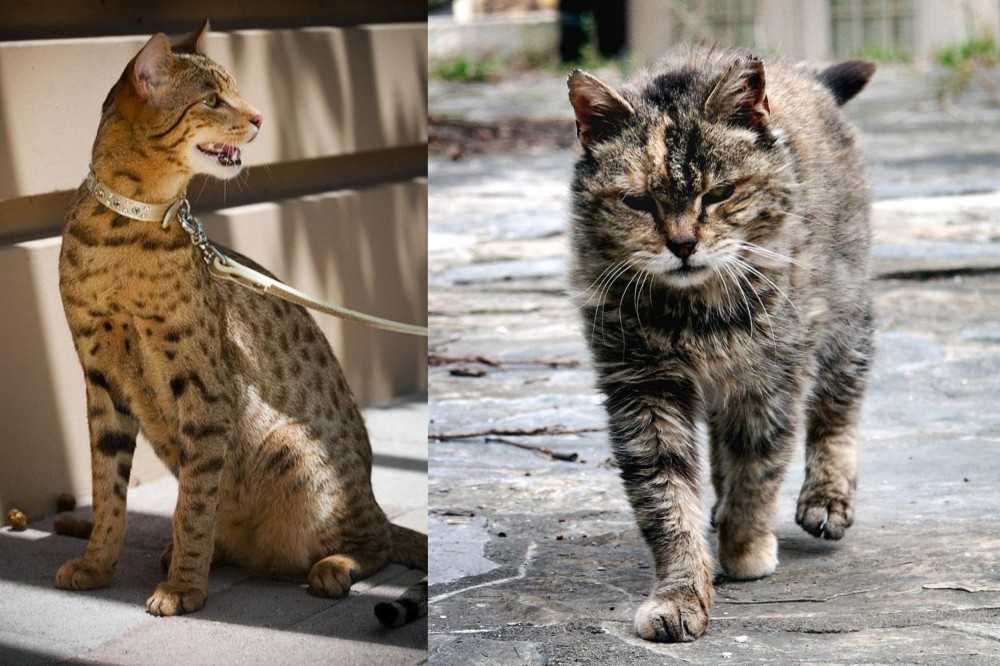 Both Ashera and Farm Cat are originated from United States. Ashera may weigh 6 kg / 14 pounds more than Farm Cat. Ashera may live 5 years more than Farm Cat. Ashera may have less litter size than Farm Cat. Both Ashera and Farm Cat requires Moderate Maintenance.
Both Ashera and Farm Cat are originated from United States. Ashera may weigh 6 kg / 14 pounds more than Farm Cat. Ashera may live 5 years more than Farm Cat. Ashera may have less litter size than Farm Cat. Both Ashera and Farm Cat requires Moderate Maintenance.
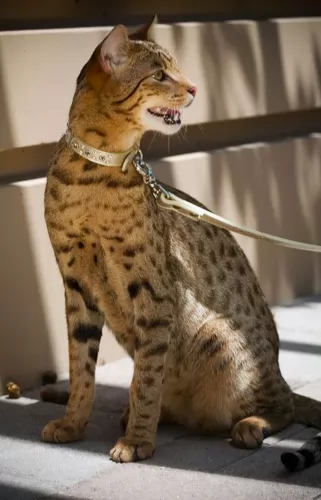 Hailing from the USA, and looking similar to the Savannah Cat, the Ashera is a hybrid breed of cat - an exotic domestic cat known as a designer cat that came about by crossbreeding the African Serval and the Asian Leopard cat.
Hailing from the USA, and looking similar to the Savannah Cat, the Ashera is a hybrid breed of cat - an exotic domestic cat known as a designer cat that came about by crossbreeding the African Serval and the Asian Leopard cat.
In fact, the cat was developed fairly recently through genetic manipulation and by the Lifestyle Pets laboratory. Also, some domestic cat was added to the mix as well, giving the cat a beautiful spotted coat similar to that of a leopard as well as some stripes.
Lifestyle Pets stopped producing these cats in 2008 so they’re hard to come by and are very expensive.
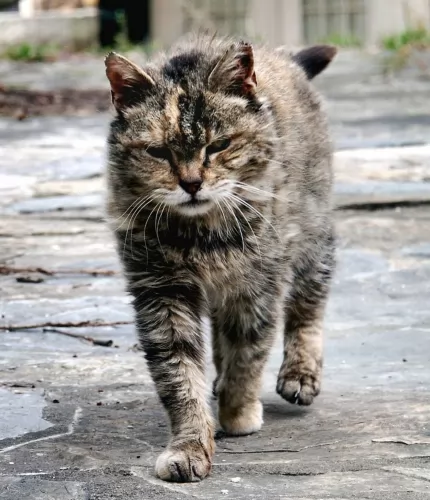 Known also as the Barn Cat, this domestic cat is of a mixed breed. The very name ‘farm cat’ is referring to a general kind of cat that lives in an almost wild state on farms and agricultural properties.
Known also as the Barn Cat, this domestic cat is of a mixed breed. The very name ‘farm cat’ is referring to a general kind of cat that lives in an almost wild state on farms and agricultural properties.
Possibly, their role in keeping rodents at bay was how they came about – domesticated to keep rodents away from grain crops.
When you do research you find that there is archeological evidence to suggests that these farm cats have been around since about 7500 BC. Most barn cats fall under the domestic shorthair or domestic longhair categories.
These cats live in a variety of conditions and some of them get their food solely from the rodents they catch. Others are tame with access to supplemental cat food as well as veterinary care.
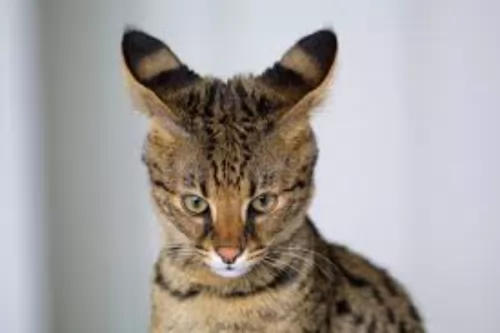 The Ashera cat has large ears with stripes and which are slightly rounded at the top. The eyes are a beautiful greenish-yellow shade.
The Ashera cat has large ears with stripes and which are slightly rounded at the top. The eyes are a beautiful greenish-yellow shade.
It's a large cat and can weigh as much as 14kg. The length of the body is long too and can be more than one meter in length. The cat is tall and if it stands up on its hind legs, it will be able to put its front paws on the shoulders of an adult.
People have always fancied owning such a large ‘domestic’ cat. There are different kinds of Ashera cats – the hypoallergenic one, the common Ashera, the snow Ashera, and the royal Aashera which looks much like the common Ashera but just a more rare type.
The Ashera is a very intelligent, independent cat and likes to climb, being a very playful cat, enjoying the company of children.
Because of its wild side, it's always on the lookout for prey. In spite of the cat’s size, it is an amicable cat and will even enjoy going on a walk with a leash. It’s not your traditional aloof cat and is both sociable and vocal and some people liken them to dogs.
Even though the cat enjoys the company of its human family, it doesn’t mind being left alone.
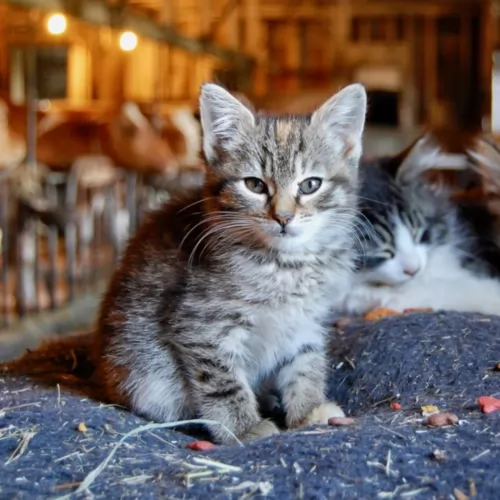 Farms cats are also members of domestic cats but it’s just that they are usually not socialized and they run away from people.
Farms cats are also members of domestic cats but it’s just that they are usually not socialized and they run away from people.
Farm cats have different histories and there is really no one-size-fits-all description of them.
They can weigh anything from 2 to 8kg. They can live to be anything between 10 and 20 years of age. Some of them are large, some small, some are solid colored while others are bi-colored and patterned. Their coats differ too and you can find short- and long-haired varieties among your farm cats
Their eyes and ears will also be in any shades and sizes and these cats are usually not spayed or neutered and can produce kittens that nobody is sure how they’ll turn out.
If you were to stumble across a farm cat born of unknown parents, there is no knowing what the small feline will behave like. Socialization and lifestyle play a big role in determining how a kitten will turn out but farm cats left to their own devices could be quiet, aggressive, loving, naughty, reticent, reserved, playful, lazy, shy or nervous.
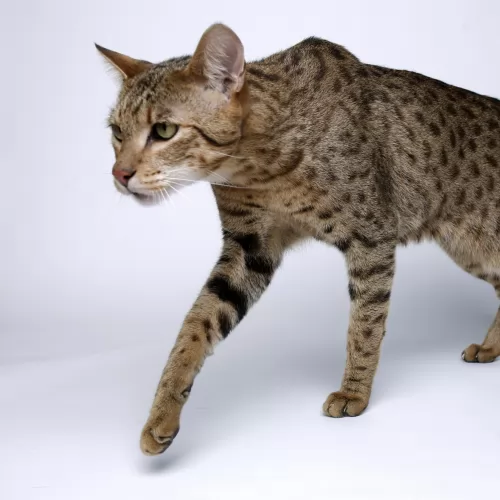 The Ashera cat is beautiful alright but you might battle to get hold of one and they cost a fortune too, being the rare breed it is.
The Ashera cat is beautiful alright but you might battle to get hold of one and they cost a fortune too, being the rare breed it is.
Hybrid cats mean that the breeding of cat species that would never have mated in the first place.
Wild cat breeds belong in the wild. They’re solitary by nature and if they battle to adjust to being in a social setting they land up in a shelter, abandoned as ‘bad news’. People aren’t clever tampering with nature particularly when it’s just to feed the ego of humans who want something unusual and exotic that nobody else has.
There are pet owners who are willing to spend enormous sums of money to own a rare cat such as the Ashera.
If you want an Ashera, there are just a few kittens being made available each year. One thing is sure, they make splendid pets, being playful, loyal, intelligent, and affectionate.
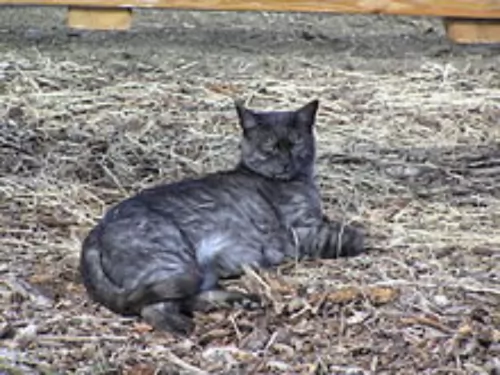 Farm cats are such wonderful animals – they just need a good chance in life like other domestic cats.
Farm cats are such wonderful animals – they just need a good chance in life like other domestic cats.
Many of them have had a hard life and it can be marvelous to open your home and heart to one or two of them and see the pleasure they bring.
They’re full of character and if you provide them with good food and a warm bed and promise to love them, you’ll no doubt be starting a solid and meaningful friendship that can enhance your life.
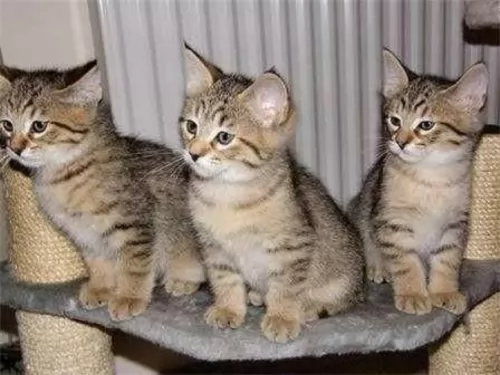 The scientists involved with the development of this cat tell us that it can reach up to 25 years of age.
The scientists involved with the development of this cat tell us that it can reach up to 25 years of age.
It’s a new cat breed and at this time there are no common diseases that affect this beautiful feline.
Remember that these cats come with an insurance policy and this means that the cat’s veterinary visits will be covered for the entire first year of its life. Your Ashera cat will also be vaccinated and chipped and the cat will have been spayed or neutered before he comes to you.
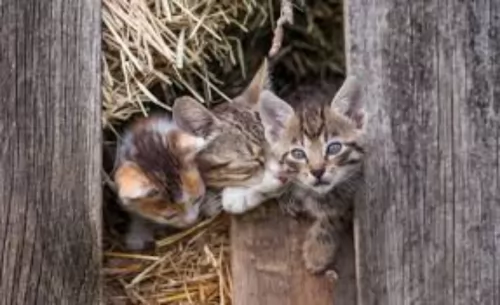 Farm cats left to fend for themselves can suffer from a host of illnesses. Eye infections are one. The cause of these eye infections is usually a virus, of which herpes, chlamydia, and Calicivirus are the most common.
Farm cats left to fend for themselves can suffer from a host of illnesses. Eye infections are one. The cause of these eye infections is usually a virus, of which herpes, chlamydia, and Calicivirus are the most common.
Your vet will certainly prescribe you some antibiotics for your kitten to help against secondary infections.
Check your farm kitten over as he is likely to have a nose full of snot as well and may even be sneezing. Take the kitten to the vet who can give him a good once-over and put him on the road to recovery.
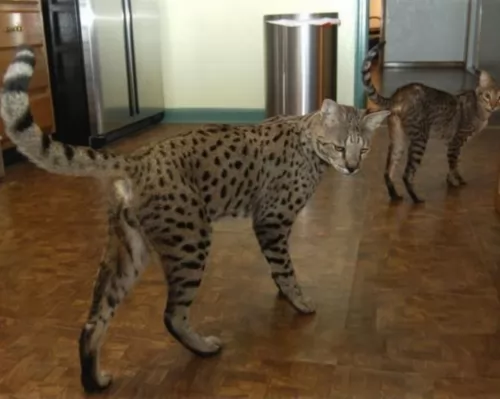 The Ashera doesn’t need any special food as they will eat the same cat food that your other cats eat. If you feed your cat commercially manufactured food, make sure its food that is of a high quality.
The Ashera doesn’t need any special food as they will eat the same cat food that your other cats eat. If you feed your cat commercially manufactured food, make sure its food that is of a high quality.
Those who have owned an Ashera cat, say tthat looking after an Ashera is much the same as lookijg after your regular domestic cat,
These cats like warmth so make sure you provide him with a warm blanket in his sleeping area.
You won’t have to worry about spaying or neutering your Ashera cat, as they are sterile. The ony place you can buy this cat is from the Lifestyle Pets laboratory. The laboratory implants a chip into the cat and they also undertake to vaccinate the cat for a year.
It’s a low maintenance cat and you can brush the short coat from time to time. Ensuring a good diet will bring about a lustrous, healthy coat.
The cat is intelligent so it will require toys that get him thinking and working things out. Also supply the Ashera with a scratching post.
They Ashera will need the best kind of cat food there is and you will want to ensure he has a good intake of protein and fats to maintain his gorgeous coat and his muscles.
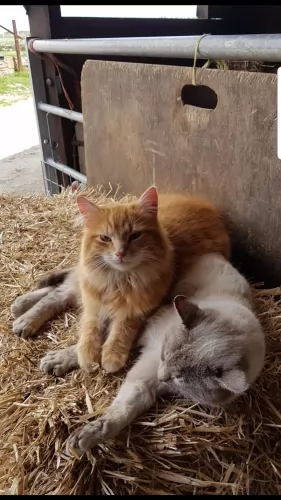 Barn cats or farm cats are not likely to have been neutered or spayed and they are just adding to the overpopulation of farm cats that can become feral cats.
Barn cats or farm cats are not likely to have been neutered or spayed and they are just adding to the overpopulation of farm cats that can become feral cats.
The average fertile cat can produce three litters every year, and with as many as 6 kittens in a litter, you can imagine how a small colony of cats can get out of control.
Sometimes cat rescue programs do a steri-drive and spay and neuter cats like this to curb the numbers. Of course, spaying and neutering can prevent many diseases as well.
If you have farm cats that have been spayed or neutered, provide them with good food and water. You can put out wet, canned cat food or dry kibble – they’ll be so pleased as most times these cats don’t even know where their next meal will come from.
You see them drinking out of puddles of water. Unfortunately, these pools are often filled with contaminants and this can also make the cats sick.
Every cat just wants a soft, warm place to sleep, and if you can, provide some warm dry hay for these farm cats. Even a cardboard box can be a haven for a cat that has never known a bed.
If you have managed to catch a farm cat kitten and you want to offer it a home, make sure to start off with veterinary care and vaccines.